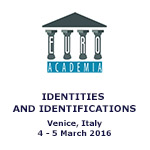Euroacademia Conferences
 Europe Inside-Out: Europe and Europeanness Exposed to Plural Observers (9th Edition) April 24 - 25, 2020
Europe Inside-Out: Europe and Europeanness Exposed to Plural Observers (9th Edition) April 24 - 25, 2020 Identities and Identifications: Politicized Uses of Collective Identities (9th Edition) June 12 - 13, 2020
Identities and Identifications: Politicized Uses of Collective Identities (9th Edition) June 12 - 13, 2020 8th Forum of Critical Studies: Asking Big Questions Again January 24 - 25, 2020
8th Forum of Critical Studies: Asking Big Questions Again January 24 - 25, 2020 Re-Inventing Eastern Europe (7th Edition) December 13 - 14, 2019
Re-Inventing Eastern Europe (7th Edition) December 13 - 14, 2019 The European Union and the Politicization of Europe (8th Edition) October 25 - 26, 2019
The European Union and the Politicization of Europe (8th Edition) October 25 - 26, 2019 Identities and Identifications: Politicized Uses of Collective Identities (8th Edition) June 28 - 29, 2019
Identities and Identifications: Politicized Uses of Collective Identities (8th Edition) June 28 - 29, 2019 The European Union and the Politicization of Europe (7th Edition) January 25 - 26, 2019
The European Union and the Politicization of Europe (7th Edition) January 25 - 26, 2019 7th Forum of Critical Studies: Asking Big Questions Again November 23 - 24, 2018
7th Forum of Critical Studies: Asking Big Questions Again November 23 - 24, 2018 Europe Inside-Out: Europe and Europeanness Exposed to Plural Observers (8th Edition) September 28 - 30, 2018
Europe Inside-Out: Europe and Europeanness Exposed to Plural Observers (8th Edition) September 28 - 30, 2018 Identities and Identifications: Politicized Uses of Collective Identities (7th Edition) June 14 - 15, 2018
Identities and Identifications: Politicized Uses of Collective Identities (7th Edition) June 14 - 15, 2018
Progenies of Priam:The Trojan War and the Propaganda of Identity and Belonging
-
-

-
Presentation speakers
- Kristin M. Barry, Ball State University, USA
- Download presentation
Abstract:
Characterized within ancient literature as a defining moment at the inception of modern history, the Trojan War introduced players and leaders from all over the Mediterranean, uniting east and west, north and south, in a ten-year battle of epic proportions. Since then, stories of the war have resonated with societies all over the western and eastern worlds, and played a significant role in early modern nation-building and genealogical legitimacy, despite the unsubstantiated history. From Caesar Augustus/Octavian to the Norse dynasty to the Ottoman Empire, leaders fabricated ancestral ties to the powerful Trojan War kings and heroes have formed often-contested alliances or identities, uniting countries in a shared past, and connecting the Mediterranean through a complicated web of related visual culture. Frequently, these falsified genealogies must be accommodated alongside documented history or other religious traditions in order to make leaders as powerful and individual as possible, or keep rivals from claiming validity through their own ancestral histories. Told through visual culture and artifacts scattered throughout the world, this paper explores the quest for legitimacy and belonging in nation-building and propaganda as related to the Trojan War and its participants, and how the myth-historical event continues to resonate with a modern artists and leaders.
-
Related Presentations

Borders Objects: Dissolution or Exacerbation of Identity
- Sabine Du Crest













